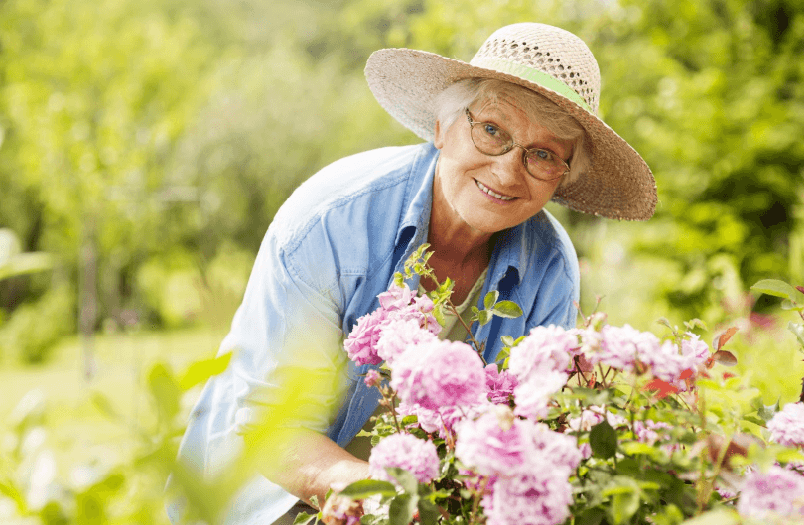
Overwhelmed by Burnout and Stress?
Feeling overwhelmed and burnt out is common among adults, especially today. According to a 2024 survey by Talker Research for Traditional Medicinals, 41%[1] of Americans reported feeling stressed and burnt out by their daily tasks, from professional responsibilities to household chores and more. In moments when life feels overwhelming and your to-do list keeps stacking up, picking up a new hobby can seem like the last thing you want to do. Why add something new to your plate? However, what if I told you that taking up a new hobby could help you de-stress from that seemingly impossible list of tasks and prevent future burnout?
When addressing burnout and stress, it is important to remember that rest and relaxation should be a line item on your to-do list, not just a reward for having checked off what you consider “actual” chores. One hobby that can be great for getting you outside and away from a screen is gardening. Gardening offers a great way to relax because it forces our minds to engage in the present and focus on the immediate task at hand. It also provides some great health benefits. If you’re interested in learning how gardening is more than just a hobby, keep reading!
The Mindful Practice of Gardening
It’s no secret that spending time outdoors can be great for your mind and body. Fresh air, vitamin D, and time away from screens can all have a positive impact on your stress levels and overall health. Gardening allows you to easily access all three of these benefits.
According to an article published by the Mayo Clinic, “Spending time outdoors has been shown to reduce heart rate and muscle tension. Sunlight lowers blood pressure and increases vitamin D levels.”[2] These positive effects on your health boost your brain health and overall mental well-being. Along with these benefits, gardening is a great way to engage in mindfulness, the practice of intentionally paying attention to what you’re sensing and feeling in the present moment.
When you work on a project like gardening, you have to focus on what you’re doing. This may sound obvious but removing your ability to multitask forces you to become present in what you’re doing. For example, it would be difficult to scroll through your email while digging up soil. Gardening helps us practice intentional mindfulness, which is at the core of de-stressing. Once we set aside our long list of tasks, we can be present in the moment, even if it’s just for a few minutes a day.
Mindfulness and intentionality with gardening comes into play at the very early stages of the process. You first need to determine what you want to plant, the materials and tools you’ll need, and where it will go in your yard. Starting small with a single plant can make the endeavor feel less overwhelming. Choosing a plant that can thrive in your climate will set you up better for success. Herbs can be a great place to start. As your plants grow, so will you. Your perceptions will change, and you will learn to notice small changes over time, furthering your appreciation of the process.
How Much Time Outdoors Do You Need?
According to a study published in 2019, spending 20 minutes, three times per week outdoors, is a good amount of time to aim for. Researchers took biomarker samples from participants and studied how their cortisol levels changed when exposed to nature for different amounts of time per week. The participants were studied over an eight-week period and were each required to spend a minimum of 10-minutes in nature three times per week. Ultimately, they found that the benefits of nature exposure for participants were “greatest between 20 and 30 min, after which benefits continued to accrue, but at a reduced rate.”[3] Those who spent 20 minutes outside, three times per week, had the lowest cortisol levels.
Cortisol, often termed the “stress hormone,”[4] regulates several functions in your body, primarily your stress response. During times of stress, your body will have higher cortisol levels because it is acting to protect you from the perceived stressful danger you are facing. Prolonged high cortisol levels can adversely affect your body. Spending time outdoors has been proven to reduce cortisol levels and bring your body back to a more stable state where you are no longer in “fight or flight”[5] mode.
In Summary
Gardening as a hobby can help you in a myriad of ways when trying to de-stress. Getting outside has been shown to help reduce overactivity in the brain, which leads to negative side effects in the body. By taking a few minutes out of your week to spend some time outdoors, engaging in the mindful practice of gardening, you can unwind while improving your health.
[1] https://talker.news/2024/09/17/nearly-2-in-5-americans-at-peak-stress-levels-of-this-year/
[2] https://www.mayoclinichealthsystem.org/hometown-health/speaking-of-health/dig-into-the-benefits-of-gardening
[3] https://www.frontiersin.org/journals/psychology/articles/10.3389/fpsyg.2019.00722/full
[4] https://www.mayoclinichealthsystem.org/hometown-health/speaking-of-health/dig-into-the-benefits-of-gardening
[5] https://my.clevelandclinic.org/health/articles/22187-cortisol
